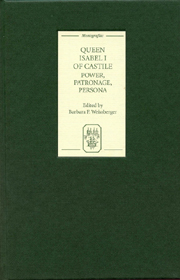Book contents
- Frontmatter
- Contents
- List of Contributors
- Acknowledgments
- Introduction: “Questioning the Queen, Now and Then”
- PART 1 INFLUENCE: ARAGON, PORTUGAL, AND NORTHERN EUROPE
- Part 2 Patronage: Reciprocal Relationships
- “The Reciprocal Construction of Isabelline Book Patronage”
- “Hernando de Talavera and Isabelline Imagery”
- “Melodies for Private Devotion at the Court of Queen Isabel”
- “The Queen at War: Shared Sovereignty and Gender in Representations of the Granada Campaign”
- Part 3 Period: From Medieval to Modern
- Works Cited
- Index
“The Queen at War: Shared Sovereignty and Gender in Representations of the Granada Campaign”
from Part 2 - Patronage: Reciprocal Relationships
Published online by Cambridge University Press: 12 September 2012
- Frontmatter
- Contents
- List of Contributors
- Acknowledgments
- Introduction: “Questioning the Queen, Now and Then”
- PART 1 INFLUENCE: ARAGON, PORTUGAL, AND NORTHERN EUROPE
- Part 2 Patronage: Reciprocal Relationships
- “The Reciprocal Construction of Isabelline Book Patronage”
- “Hernando de Talavera and Isabelline Imagery”
- “Melodies for Private Devotion at the Court of Queen Isabel”
- “The Queen at War: Shared Sovereignty and Gender in Representations of the Granada Campaign”
- Part 3 Period: From Medieval to Modern
- Works Cited
- Index
Summary
The recapture of the Islamic kingdom of Granada was one of the crowning achievements of the joint reign of Isabel of Castile (1451–1504) and Fernando of Aragon (1452–1516). They committed manpower, resources, money, and approximately ten years of their rule to the effort, finally achieving victory in 1492. As with all the other actions and decisions of their reign, however, it is necessary to set this achievement in the context of shared sovereignty. They prosecuted the war together, and a complete understanding of the endeavor requires a careful investigation of the roles played by each monarch in achieving the desired end, as they were represented by their contemporaries. Despite Fernando's prominent and overtly military role in the campaign, for example, contemporary observers and chroniclers often credited the Queen with both the mental burden and the success of the effort. Ultimately, the Queen's concern was rewarded. According to one observer, the war would have failed without her diligence and efforts (Liss 2004b: 216). Set against Fernando's certain role in the reconquest – leading troops on the field of battle, for example – contemporary emphasis on and praise for Isabel's role in the conflict prompts a set of questions about the responsibilities assumed by each monarch. How could a military engagement in which Isabel never fought come to be so closely identified with her efforts?
- Type
- Chapter
- Information
- Queen Isabel I of CastilePower, Patronage, Persona, pp. 108 - 120Publisher: Boydell & BrewerPrint publication year: 2008



